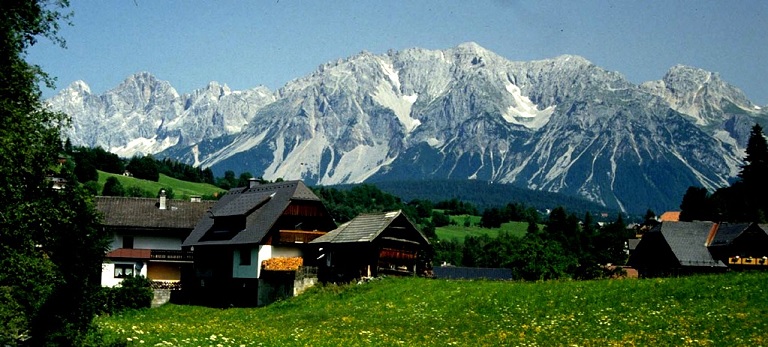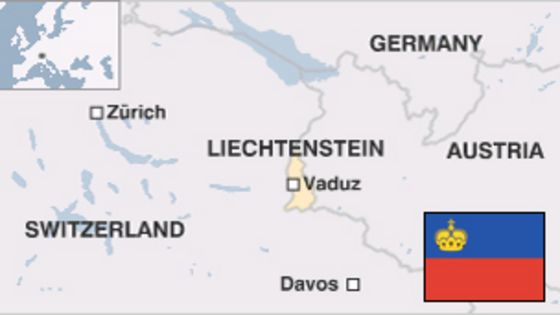To be honest, I always get Liechtenstein and Luxembourg
mixed up. They’re both small countries in Europe that start with L. (Even
though, Luxembourg in comparison is far larger than Liechtenstein. Actually, I
think the coffee stain on my desk is larger than Liechtenstein.) So, hopefully
doing this blog will help me keep them straight.
Liechtenstein is named after the Liechtenstein dynasty and
literally means “light stone” (the “light” in this sense meaning “bright”). It
was once part of the Holy Roman Empire, and the Emperor named this region after
the family.
This sliver of land is located between Switzerland and
Austria in central Europe. The entire country is generally located halfway
between Innsbruck, Austria and Bern, Switzerland. It’s what’s considered a
double landlocked country, meaning that the countries surrounding it are also
landlocked countries. So, essentially Liechtensteiners have to travel through
two countries in order to reach a coast. The country is located in the Alps,
and the border with Switzerland is the Rhine River.
This region was originally part of the Roman Empire. The
Alemanni (a Germanic tribe) were one of the largest inhabitants here before the
Frankish Empire defeated them, and it changed hands again. By the 1200s, there
were several dynasties that were established throughout the region. As they
started to fall to other dynasties, the borders changed several times. Essentially,
the Holy Roman Emperor bought off the remaining dynasties, forced them to
combine lands and decreed it to be named after the Liechtenstein dynasty. After
the Napoleonic Wars caused this area to fall under French rule, it later joined
the German Confederation (which was ruled by the Emperor of Austria). For most
of the 1800s up until the end of WWI, Liechtenstein had close ties with
neighboring Austria and later Austria-Hungary. When Austro-Hungary broke up,
Liechtenstein was kind of by itself for a while. During WWII, Liechtenstein
began to look to Switzerland for assistance in its desire to remain neutral.
Although it did remain neutral, there were some Nazi sympathizers despite no
official Nazi party, and Liechtenstein did provide asylum to Russian soldiers.
Liechtensteiners were prohibited from entering Czechoslovakia during the Cold
War years, and it remained that way until 2009 when the country re-established
diplomatic relations with the Czech Republic and Slovakia. As a means of
strengthening revenue for the country, they lowered corporate tax rates during
the 1970s and is now one of the richest countries in the world. Women weren’t granted the right to vote
until 1984 and weren’t able to vote in their first election until 1986.
For many countries, the capital city is the largest city in
the country, but not so for Vaduz. While Vaduz is the center of government, the
neighboring city of Schaan to the north is the largest city (but it’s only
larger by about 500-600 people). Both cities are located along the Rhine River
on the western side of the country. The Vaduz Castle, where the Liechtenstein
family once resided, is one of the most famous landmarks in the area. The
Cathedral of St. Florin, a Roman Catholic church built in 1873, is also another
famous landmark. Prince Franz Joseph II and his wife are buried there along
with the wife of Prince Franz I. Vaduz is connected to other major cities in
the region by bus and train; the nearest airport is in Zurich, Switzerland.
Vaduz is home to a few museums and historical buildings along with a stadium
for Vaduz’s soccer team.
Liechtenstein is small (obviously) and has limited natural
resources. So, to figure out a way to boost their economy, they started
offering super low corporate tax rates— a flat rate of 12.5%. (Andorra does
this too, but theirs is 10%.) They also make it really easy to incorporate your
business there as well; many holding companies register these companies
(sometimes called “letter box companies”) under the name of a Liechtensteiner,
usually a lawyer. This way it offers a type of anonymity for the true business
owner and creates a tax haven for foreign companies. (How convenient.) Outside
of tax evasion, the country also makes money in a less lucrative way:
manufacturing (they are the world’s largest producer of false teeth—and that’s
something to smile about), electronics, tools, pharmaceuticals, and others.
They’re also known for their wine and beer.
The vast majority of Liechtensteiners are Roman Catholic,
and a small number are Protestant. There are also a significant number of
Muslims and non-religious people.
The official language is German; however, most
Liechtensteiners speak an Alemannic dialect, which is actually quite different
from Standard German. It’s closer to Swiss Standard German, which is what most
people speak and understand. What’s interesting is that Liechtensteiners aren’t
the only ones who speak Alemannic German. Besides portions of neighboring countries,
it’s also spoken by the Amish in Allen County, Indiana (where Fort Wayne
is—about two hours north of me).
Because Liechtenstein is so small, they have a relatively
low crime rate. In fact, many people don’t even lock their doors at night. They
are also keen on observing quiet times during the national lunch time of 12
noon to 1:30pm as well as after 10 pm. And once a year, all the residents are
invited to have a beer with the Prince. It sounds to me like a great big retirement
community. And given their proximity to Switzerland and Austria, I think their
food will be rather tasty. My sister donated a couple of venison steaks to the
cause, shot by my brother-in-law. I will start marinating it tomorrow. I’m
hungry already.








No comments:
Post a Comment